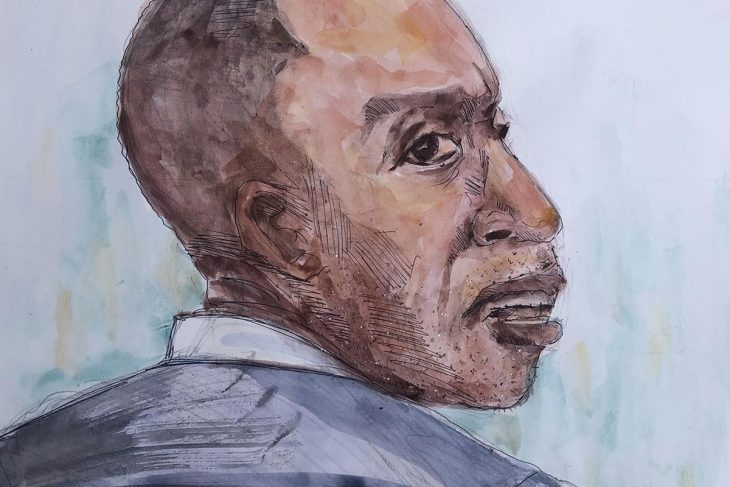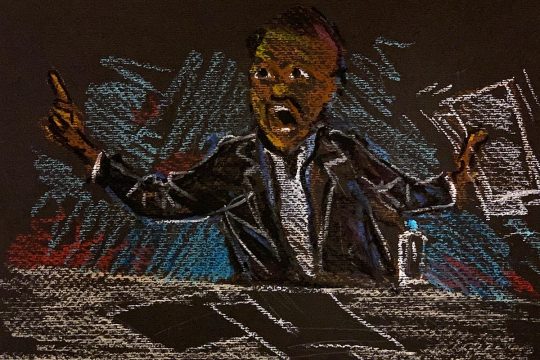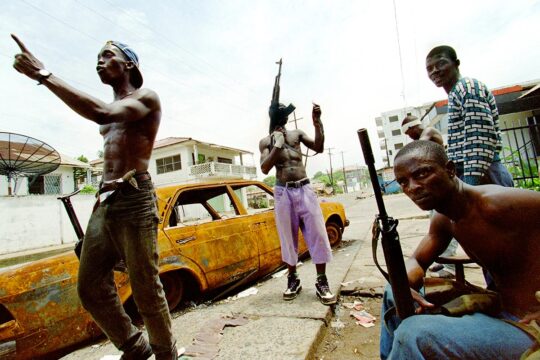The suspense did not last long in the corridors of the Federal Criminal Court in Bellinzona (southeast Switzerland). Just a few minutes after the court clerk began reading the verdict, the die was cast. Alieu Kosiah was found guilty of 21 of the 25 charges against him and sentenced to 20 years in jail, the maximum penalty provided in the Swiss penal code, minus the 2,413 days (more than six and a half years) that he has spent in pre-trial detention. The judges also sentenced him to a 15-year expulsion from Swiss territory after his release from prison.
The judgment comes after five years of investigation and an indictment of more than 40 pages. Some 20 witnesses and plaintiffs mostly from Liberia took the stand for nearly four weeks. The case was led by Geneva-based NGO Civitas Maxima, which provided most of the prosecution evidence. Investigators from the Swiss Attorney General’s office were unable to visit Liberia due to a lack of agreement with the authorities there.
After a brief résumé of the facts, court president Jean-Luc Bacher began reading the court’s reasoning. This had not yet been published at the time of writing, but Justice Info has cross-checked the notes of lawyers present at the hearing, on Friday, to reconstitute the substance.
Murder, torture and rape
Sometimes waxing lyrical and citing Greek philosopher Aristotle, court president Bacher stressed the historic nature of this first trial in Switzerland under universal jurisdiction. The presiding judge recalled how militia inflicted “hell” on civilians during the first Liberian civil war, which left at least 150,000 people dead. The acts of these groups were arbitrary and “deeply unjust”, he said.
After a brief chronology of the war, the judge described Kosiah's background, first during the civil war and then during his 20 years in Switzerland, where he worked as a repairman before receiving social assistance. Then came the verdict. The court found that the former warlord ordered or committed 19 murders, organized several forced transfers of people, tortured seven people and committed one rape. The president pointed to Kosiah’s lack of repentance or remorse.
In the absence of material evidence on the events 30 years ago, the Swiss judges relied on testimony. The court had to weigh the credibility of victims' statements against those of the accused and his defence witnesses. But it seemed to have no doubts given that – in the words of the presiding judge – Kosiah showed "cynicism and arrogance" during the trial and even sometimes "hostility" towards the witnesses. The court also reproached him for “adapting his story as the proceedings progressed”. Denying all the accusations, Kosiah repeated that he was not there at the time of the events. This explanation was "not very credible in the eyes of the court", which questioned the honesty of the defence witnesses and their "obviously prepared and oriented" accounts. Another element that the judges found unconvincing was Kosiah's claim that he never witnessed any of the crimes committed by his movement, the United Liberation Movement of Liberia (ULIMO), whose violence is well documented.
Finally, the judges dismissed the conspiracy theory advanced by Kosiah and his lawyer that Civitas Maxima and its Liberian counterpart Global Justice and Research Project (GJRP) had manipulated witnesses. Stating that they had "no reason to believe that there was collusion between lawyers and NGOs on the one hand and the plaintiffs on the other", the judges noted that despite contradictions in plaintiffs’ original complaints, these were "resolved" by their explanations on the stand during the trial. Kosiah was also ordered to pay more than CHF 50,000 in civil damages to seven Liberian plaintiffs who filed civil suits.
“An enormous victory”
Presiding judge Bacher said it was normal for some memories to fade after 25 years, and that the court trusted the victims’ testimony despite some minor contradictions in court. He was also keen to point out the exceptional accuracy of Witness E’s memory. Indeed, this mathematics teacher astonished the court by accurately counting the number of people in the room during his testimony. Contacted by Justice Info after the verdict, the teacher responded in his own sober and precise way: "I was very impressed by the work of the court. I wanted to testify because I wanted justice and I got it. I am satisfied.”
Alain Werner, director of Civitas Maxima and lawyer for several of the plaintiffs, is also satisfied. Contacted after the verdict, he said he had been "slandered by Alieu Kosiah since the beginning of the proceedings". “For seven years he accused us of all kinds of evil and filed numerous criminal complaints against the plaintiffs. Today's decision shows that the court believed in the good faith of Kosiah’s victims. This is a huge victory for justice and against impunity in Liberia.” Liberian journalist Anthony Stephens, who came to cover the trial during the February hearings, agrees. "This decision comes at a historic time for the victims," he said. "It comes just before the Liberian Bar Association begins a march on Parliament to demand a war crimes law.”
Defence lawyer Dimitri Gianoli announced that he would appeal. “The Federal Criminal Court has obviously been subjected to political and media pressure and unfortunately has not been able to do justice,” he said. “It has dismissed without reason many demonstrations during the debates of inconsistencies in the prosecution case, the plaintiffs’ lack of credibility, their multiple contradictions and even lies.” Kosiah remains convinced that Civitas Maxima has “distorted the events and history of the first civil war in Liberia to make a business out of it”, according to Gianoli, who said his client would "continue his fight so that the justice to which he is entitled can be done.”







